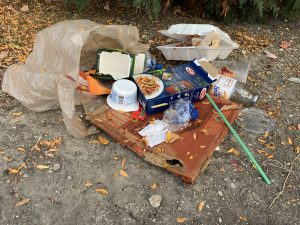Indianapolis has been labeled as the most wasteful city in the United States, according to an article from RTV6. City environmental organizations, such as the Indiana Recycling Coalition and Keep Indianapolis Beautiful, have established initiatives to offer ways for people to keep clean and live more sustainably.
Executive Director of the Indiana Recycling Coalition Allyson Mitchell said that Indianapolis’ recycling rate is at 7%, according to statistics from the Indianapolis Department of Public Works. This, according to Mitchell, is significantly lower than other similarly sized cities.
“We are one of the only, maybe the only city this size, that does not provide curbside recycling to all of its residents,” Mitchell said.
The IRC has set the strategic priority in their most recent strategic plan to fix the recycling issues in Indianapolis, which includes comprehensive curbside for all residents by 2025 according to Mitchell.
Some recycling services are subscription-based with lower participation rates of 10 to 20%, with Indianapolis’ opt-in rate at 10%, according to Mitchell. The services provided for recycling are higher per residence, Mitchell said. If it was provided for everyone, it would be cheaper, according to Mitchell. Indianapolis had invested in an incinerator in the late 80s, Mitchell said, which sent a message to people that the priority was to throw away trash and burn it.
President and Chief Executive Officer of Keep Indianapolis Beautiful Jeremy Kranowitz said that his organization is looking at ways to educate the public about sustainability. One idea the group is looking at is putting up signs at key places throughout the city that would try to convince people to drop off their trash in the correct place, rather than just on the ground, Kranowitz said. Another idea they are looking at is working with corporations to help educate the public about sustainability with bigger public events.
“We’re working with both the NCAA, and with the NBA, to try to do make those, the big events that happen in Indy more sustainable, and so there may be some education opportunities there too,” Kranowitz said.
With COVID-19 and people staying at home more than ever, more waste has been accumulated from individual households, he said. The amount of household waste has increased 30 and 40% compared to last year, according to Kranowitz.
Mitchell said that there are roles to be played by students and youth in that students can help to inform and spread the word about the IRC’s initiative and help others understand the steps necessary to obtain a more sustainable environment.
“We have an education program that we’re launching later this year, and into 2021 as well, that is aimed specifically at helping residents understand recycling and the circular economy and their role in it, and that’s called the Master Recycler Program,” Mitchell said.
Mitchell said Indianapolis has not invested in education surrounding solid waste and recycling, which spans around three decades with lack of any sort of education on how to properly manage waste. She said because it is more expensive to pay for recycling on an individual basis, the only alternative is to drive to one of the city’s recycling centers. This, however, makes it hard for those who do not have a car, are disabled, or are unable to participate in the system due to other reasons, she said.
Mitchell said that the IRC will be launching a free education program later this year, and into 2021, that is specifically aimed at helping residents understand recycling, the circular economy and their role in the process. The program is called the Master Recycler Program and will be a completely online program that will be accessible on any device, Mitchell said.
Mitchell said this is a great opportunity to engage with peers about sustainability. There are online classes that are provided through the Master Recycler Program that are accessible on tablets, mobile devices and laptops, Mitchell said.
“It’ll be free, and it will allow you to use those interstitial moments of your life — waiting for the bus [or] waiting for class — to start to take a lesson and learn a little bit about recycling in the circular economy and do it in a way that it helps you engage with your family, your friends, and your peers,” Mitchell said. “Part of what the Master Recycler Program is going to do also is help you understand how you can get engaged to make meaningful change in both the policies, and your individual daily habits and practices.”
According to Kranowitz, KIB has a program called Adopt a Block, where people can “adopt” blocks to help clean and KIB would offer equipment so it is not out of pocket. This offers residents, and students, an opportunity to be a part of a larger database and collectively volunteer to pick up trash off the street.
“It could be the block outside your dorm room, it could be a block … anywhere in the city, and KIB will provide things like gloves and litter pickers and bags and other things and give you the equipment so that you can [pick up trash],” Kranowitz said.







